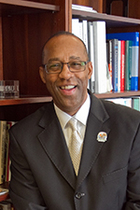Executive Director's View
My Story
I was born in the Bronx, NY a year before the Supreme Court Brown vs. Board of Education verdict was handed down. My parents were civil rights activists who taught me the power of my voice to change my own life and the lives of others. My neighborhood police station was also known by the nickname "Fort Apache," a term I later learned was negatively aimed at African Americans and not Native Americans.
This police station would become an important part of my life, as my father conducted many marches to protest the lack of heat and hot water in the neighborhood community apartment buildings owned by landlords who refused to repair their buildings in the middle of winter. These wealthy landlords had previously rented to all white families, and when the neighborhood started to change as white families discovered the suburbs and more black and Hispanic families took their place, it was not a priority to treat these new renters the same as the old ones.
I remember a few Christmas mornings waking up in the police station as it was the only place that had heat, and my father was determined that we were going to make a statement to the landlords by exposing them to a city wide audience. I’m sure that he never thought about the others who might see our plight beyond the walls of our city or the lives that he would influence. One Christmas morning we finally had heat in our building of 40 families.
I admired my Dad for what he did and I was proud to be his son. I learned very early to never be afraid to raise my voice and speak out for justice and fairness whatever the cause.
The time has come again for voices to be heard and a call to action needs to be initiated to respond to the serious challenges facing students attending community colleges, the faculty and staff who work there, and the institutions themselves. We all have recently witnessed the failure of companies too big to fail, and higher education institutions are not immune from the same fate.
First:
Professional associations in higher education must be advocates for more than our boards of directors, our membership concerns, our business partner relationships, or our own professional survival. We must move outside the box and become active thought leaders who advocate positions that challenge all the stake holders in higher education to find better answers to increase student outcomes and to relieve increasing debt burdens, rising tuition costs, and disparities in the demographics of race and gender as it relates to access to a college education.
Second:
Community College Business Officers must take action to develop solutions by learning from each other, and not simply waiting upon the next regulatory position paper that does not provide solutions but instead just provides information on how to fill out the new forms.
Third:
Faculty and students are allies and advocates as each have long supported community college initiatives and have worked hard to deliver education and resources to those who have been described as non-traditional students, but are in fact the new traditional students.
Finally:
As my father taught me a long time ago, we cannot wait to be delivered, we must deliver ourselves as best we can and then when the opportunity arises be ready to serve, "change is coming."
Ron Campbell, CASP
CCBO Executive Director

